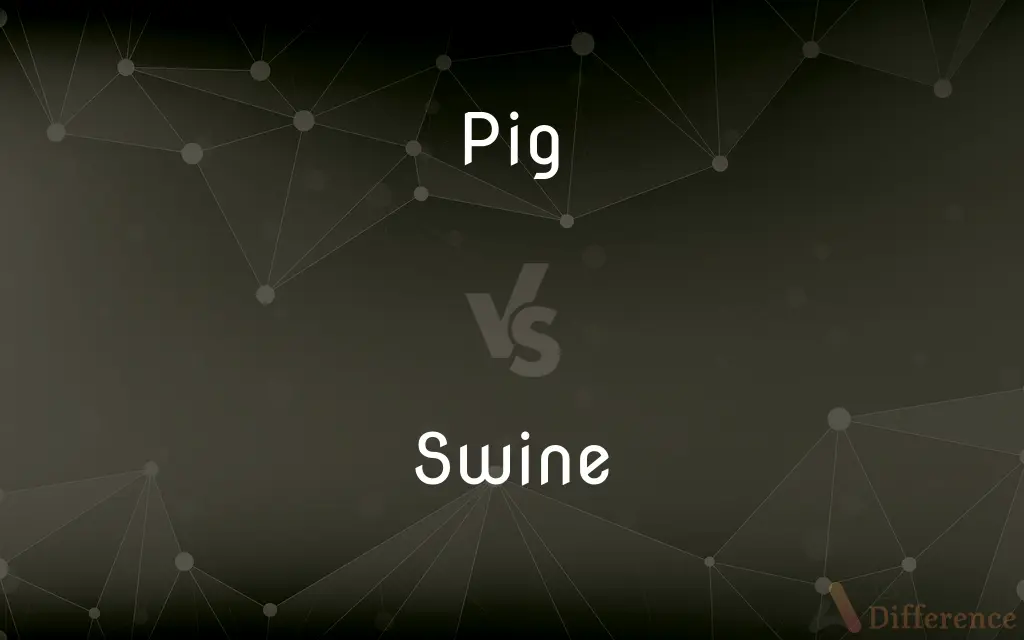Pig vs. Swine — What's the Difference?
By Tayyaba Rehman — Updated on November 23, 2023
"Pig" generally refers to the domestic animal, known for its stout body and snout, while "swine" is a broader term for the entire species, including wild and domestic varieties.

Difference Between Pig and Swine
Table of Contents
ADVERTISEMENT
Key Differences
The word "pig" typically refers to the domesticated animal known for its pink skin, short legs, and snout used for digging. It's commonly used in everyday language and often associated with farm life. On the other hand, "swine" is a term that encompasses both domestic pigs and their wild relatives. It is more formal and is used in scientific and agricultural contexts to refer to the species as a whole.
In colloquial use, "pig" often carries various cultural and symbolic meanings, sometimes used as a term of endearment or, conversely, as an insult. "Swine," however, maintains a more neutral and formal tone, typically devoid of these additional connotations. It's often used in technical discussions about the animal's biology, breeding, and husbandry.
The plural form of "pig" is "pigs," which is used to refer to multiple individuals of the domestic species. In contrast, "swine" can be both singular and plural, which adds to its formal and scientific tone. The use of "swine" is common in agricultural policies, veterinary sciences, and academic research.
"Pig" is also versatile in its usage, extending into phrases and idioms like "guinea pig" or "eat like a pig," which are part of everyday English language. "Swine," however, is rarely seen in such idiomatic expressions and is typically reserved for more formal or technical discourse.
To summarize, while "pig" is a more familiar and colloquial term with various cultural implications, "swine" is a broader, more formal term used in scientific and agricultural contexts. Both words are integral to discussions about these animals but are used in different settings and with slightly different connotations.
ADVERTISEMENT
Comparison Chart
Reference
Usually domesticated animals
Both domestic and wild varieties
Usage Context
Common in everyday language
More formal, scientific contexts
Connotations
Cultural and symbolic meanings
Neutral, scientific tone
Plural Form
"Pigs"
"Swine" (singular and plural)
Idiomatic Usage
Common in idioms and phrases
Rarely used in idioms
Compare with Definitions
Pig
A domesticated farm animal known for its snout.
The pig rolled in the mud to cool off.
Swine
Can denote a contemptible person in literary usage.
He was referred to as swine in the novel.
Pig
Used in various idiomatic expressions.
He's the guinea pig for the new training program.
Swine
Refers to both domestic and wild pig species.
Swine are susceptible to various diseases.
Pig
Used as a derogatory term for a greedy person.
She called him a pig for his selfish behavior.
Swine
Used in agricultural and scientific contexts.
Swine farming is an important industry.
Pig
A symbol of gluttony or messiness.
He eats like a pig at every meal.
Swine
Used in historical or biblical contexts.
Swine were considered unclean in ancient cultures.
Pig
A young, small domestic pig.
The farmer raised several pigs on his farm.
Swine
A formal term for pigs in collective discussions.
The study focused on the behavior of swine.
Pig
A pig is any of the animals in the genus Sus, within the even-toed ungulate family Suidae. Pigs include domestic pigs and their ancestor, the common Eurasian wild boar (Sus scrofa), along with other species.
Swine
Any of various omnivorous, even-toed ungulates of the family Suidae, having a stout body with thick skin, a short neck, and a movable snout, especially the domesticated pig.
Pig
An omnivorous domesticated hoofed mammal with sparse bristly hair and a flat snout for rooting in the soil, kept for its meat.
Swine
A person regarded as contemptible or disgusting.
Pig
A greedy, dirty, or unpleasant person
I bet he's scoffed them all, greedy pig
Swine
A pig the animal.
Pig
A police officer
Were the pigs there when the windows were smashed or not?
Swine
(pejorative) A contemptible person plural swines.
Pig
An oblong mass of iron or lead from a smelting furnace.
Swine
A police officer; a "pig".
Pig
A device which fits snugly inside an oil or gas pipeline and is sent through it to clean or test the inside, or to act as a barrier.
Swine
Something difficult or awkward; a pain.
That old car is a swine to manoeuvre.
Pig
Gorge oneself with food
Lovesick people pig out on chocolate
Swine
(archaic) sow
Pig
Crowd together with other people in disorderly or dirty conditions
He didn't approve of the proposal to pig it in the studio
Swine
Any animal of the hog kind, especially one of the domestical species. Swine secrete a large amount of subcutaneous fat, which, when extracted, is known as lard. The male is specifically called boar, the female, sow, and the young, pig. See Hog.
Pig
(of a sow) give birth to piglets; farrow.
Swine
Stout-bodied short-legged omnivorous animals
Pig
Operate a pig within an oil or gas pipeline
They will carry out all trenching and pigging
Pig
Any of various mammals of the family Suidae, having short legs, hooves with two weight-bearing toes, bristly hair, and a cartilaginous snout used for digging, including the domesticated hog (Sus scrofa subsp. domestica syn. S. domesticus) and wild species such as the bushpig.
Pig
A domesticated hog, especially when weighing less than 54 kilograms (120 pounds).
Pig
The edible parts of one of these mammals.
Pig
(Informal) A person regarded as being piglike, greedy, or disgusting.
Pig
Derogatory Slang A police officer.
Pig
A crude block of metal, chiefly iron or lead, poured from a smelting furnace.
Pig
A mold in which such metal is cast.
Pig
Pig iron.
Pig
To give birth to pigs; farrow.
Pig
Any of several mammalian species of the genus Sus, having cloven hooves, bristles and a nose adapted for digging; especially the domesticated animal Sus domesticus.
The man kept a pen with two pigs that he fed everything from carrots to cabbage.
Pig
(specifically) A young swine, a piglet contrasted with a hog, an adult swine.
Pig
(uncountable) The edible meat of such an animal; pork.
Some religions prohibit their adherents from eating pig.
Pig
(uncountable) A light pinkish-red colour, like that of a pig (also called pig pink).
Pig
Someone who overeats or eats rapidly and noisily.
You gluttonous pig! Now that you've eaten all the cupcakes, there will be none for the party!
Pig
A dirty or slovenly person.
He was a pig and his apartment a pigpen; take-away containers and pizza boxes in a long, moldy stream lined his counter tops.
Pig
(derogatory) A very obese person.
Pig
A police officer.
The protester shouted, “Don't give in to the pigs!” as he was arrested.
Pig
(informal) A difficult problem.
Hrm... this one's a real pig: I've been banging my head against the wall over it for hours!
Pig
A block of cast metal.
The conveyor carried the pigs from the smelter to the freight cars.
After the ill-advised trade, the investor was stuck with worthless options for 10,000 tons of iron pig.
Pig
The mold in which a block of metal is cast.
The pig was cracked, and molten metal was oozing from the side.
Pig
A lead container used for radioactive waste.
Pig
(engineering) A device for cleaning or inspecting the inside of an oil or gas pipeline, or for separating different substances within the pipeline. Named for the pig-like squealing noise made by their progress.
Unfortunately, the pig sent to clear the obstruction got lodged in a tight bend, adding to the problem.
Pig
The general-purpose M60 machine gun, considered to be heavy and bulky.
Unfortunately, the M60 is about twenty-four pounds and is very unbalanced. You try carrying the pig around the jungle and see how you feel.
Pig
(uncountable) A simple dice game in which players roll the dice as many times as they like, either accumulating a greater score or losing previous points gained.
Pig
A sixpence.
Pig
(Scottish) earthenware, or an earthenware shard
Pig
An earthenware hot-water jar to warm a bed; a stone bed warmer
Pig
(of swine) to give birth.
The black sow pigged at seven this morning.
Pig
(intransitive) To greedily consume (especially food).
They were pigging on the free food at the bar.
Pig
(intransitive) To huddle or lie together like pigs, in one bed.
Pig
(intransitive) To live together in a crowded filthy manner.
Pig
To clean (a pipeline) using a pig the device.
Pig
A piggin.
Pig
The young of swine, male or female; also, any swine; a hog.
Pig
Any wild species of the genus Sus and related genera.
Pig
An oblong mass of cast iron, lead, or other metal. See Mine pig, under Mine.
Pig
One who is hoggish; a greedy person.
Pig
To bring forth (pigs); to bring forth in the manner of pigs; to farrow.
Pig
To huddle or lie together like pigs, in one bed.
Pig
Domestic swine
Pig
A coarse obnoxious person
Pig
A person regarded as greedy and pig-like
Pig
Uncomplimentary terms for a policeman
Pig
Mold consisting of a bed of sand in which pig iron is cast
Pig
A crude block of metal (lead or iron) poured from a smelting furnace
Pig
Live like a pig, in squalor
Pig
Eat greedily;
He devoured three sandwiches
Pig
Give birth;
Sows farrow
Common Curiosities
Can "swine" refer to a single animal?
Yes, "swine" can be singular or plural.
Are "pig" and "swine" interchangeable?
In many contexts, but "swine" is more formal and broader.
Does "swine" have negative connotations?
Not usually, it's neutral and scientific.
Do "pig" and "swine" have the same origins?
Both have Old English origins but have evolved differently.
Is "pig" always domesticated?
Yes, "pig" typically refers to domesticated animals.
Is "pig" used in scientific writing?
Less commonly, as "swine" is preferred in scientific contexts.
Is "swine flu" related to pigs?
Yes, it's a flu type initially associated with swine.
Is "swine" used in everyday conversation?
Rarely, as it's more formal and scientific.
Are there breeds of swine?
Yes, there are many breeds within the swine species.
Can "pig" refer to wild animals?
Generally, no; "pig" usually means domesticated.
Are piglets young swine?
Yes, piglets are young pigs, which are a type of swine.
Can "pig" be used as an insult?
Yes, it's sometimes used derogatorily.
Are pigs and swine intelligent animals?
Yes, both domestic pigs and swine are considered intelligent.
Is "swine" used in legal or policy language?
Yes, especially in agricultural laws and guidelines.
Do pigs play roles in cultural stories?
Yes, pigs feature in many cultural tales and idioms.
Share Your Discovery

Previous Comparison
Affiant vs. Deponent
Next Comparison
Aristocracy vs. DemocracyAuthor Spotlight
Written by
Tayyaba RehmanTayyaba Rehman is a distinguished writer, currently serving as a primary contributor to askdifference.com. As a researcher in semantics and etymology, Tayyaba's passion for the complexity of languages and their distinctions has found a perfect home on the platform. Tayyaba delves into the intricacies of language, distinguishing between commonly confused words and phrases, thereby providing clarity for readers worldwide.














































